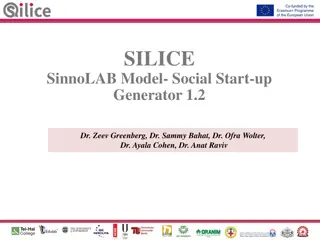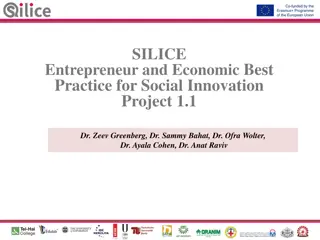Social Entrepreneurship and Value Co-creation
Social entrepreneurship explores the behavior and goals of social ventures, focusing on founders' traits and competencies. It emphasizes tangible outcomes, typology of social entrepreneurs, learning with a market-based approach, and the network structures that enhance value creation.
Download Presentation

Please find below an Image/Link to download the presentation.
The content on the website is provided AS IS for your information and personal use only. It may not be sold, licensed, or shared on other websites without obtaining consent from the author.If you encounter any issues during the download, it is possible that the publisher has removed the file from their server.
You are allowed to download the files provided on this website for personal or commercial use, subject to the condition that they are used lawfully. All files are the property of their respective owners.
The content on the website is provided AS IS for your information and personal use only. It may not be sold, licensed, or shared on other websites without obtaining consent from the author.
E N D
Presentation Transcript
Chapter 4: Social Entrepreneurship and Social Value Co-creation
Social Entrepreneurship, Social Value & Transformation:Approaches Research examining the entrepreneurial behaviour and goals of social ventures Research focusing on the personality and distinctive characteristics, traits and competencies of the social venture founder Research on social enterprise concentrating on the tangible outcomes of social entrepreneurship.
Typology of Social Entrepreneurs Social bricoleurs Social constructionists Social engineers
Learning with the market A market-based approach for creating social value Outcomes of learning with the market . Dimensions of Learning Outcomes L earning capabilities required
Outcomes of learning with the market Network Structure Market Practices that happen between actors in the market network Market Pictures
Dimensions of Learning Outcomes Inclusion or exclusion of actors in a network Access to networks and creation of network ties Exchange Practices Normalised Practices Representational practices Idiosyncratic sense-making processes
Learning Capabilities Required Ability to: develop, maintain and manage a network structure engage in the tie formation with other market actors format exchange practices format normalised practices format representational practices change the existing mental models and institutionalise new ones overcome the institutions























